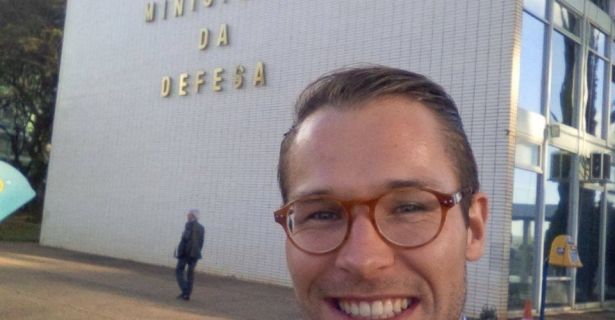NATO-BRAZIL RELATIONS
During the second half of my research in Brazil, I was able to intensify my background knowledge by studying more about the history of Brazilian foreign and security policy, which is crucial to understand the country’s strategic culture and the resulting effects on Brazil’s external relations.
In addition to diving into the literature, I was able to put current events into context by talking to key stakeholders in Brasilia, including representatives of the Ministry of External Relations, Ministry of Defense, think tanks, university departments and several European embassies. Here are my takeaways:
Connecting the dots – how Brazil’s economic recession raises the potential for closer security and defense cooperation with the US and Europe
Let me start by highlighting the severity of Brazil’s economic crisis. The GDP is shrinking, inflation scratches the double digits and foreign trade is greatly diminishing (trade with the country’s main trading partner China is down almost a fifth in 2015!). The low oil price makes further exploration of the pre salt oil reserves off the coast of Rio de Janeiro uneconomical. The scandals involving Brazil’s oil giant Petrobras seem to be only the top of the iceberg of the country’s systemic corruption practices that lingers in the highest levels of the government.
These developments have important implications for Brazil’s international posture. Five years ago, most Brazilian government officials were convinced that their country is set to be one of the next great powers. Today, many have sobered up, facing the limits of growth based on structural problems, including education (about one in ten Brazilians is illiterate), poor infrastructure and imprudent trade policy.
This also limits the potential for power projection abroad. Not only leaves the Brazilian defense budget little room for investments in strategic capabilities and R&D (60+% of the Brazilian defense budget is spent on personnel compared to less than 30% percent in the US), the budget itself will suffer from the economic realities (Brazil's 2015 defense procurement budget alone was cut by 25%).
Consequently, prestigious projects, such as the construction of nuclear-powered submarines with the help of France and the acquisition of the Gripen fighter jets from Sweden, will have to be delayed. It is unclear how many resources Brazil can commit to the general modernization of the country’s armed forces that would allow them to boost their activities in the Amazon, let alone off shore in the South Atlantic and beyond. Naturally, Brazilian security policymakers who aspire to take on a greater role in international security are upset about this situation.
Their resentment is exacerbated by internal dynamics that leaves little room for adjusting policy to the current realities. Under the Lula Administration, the leadership of the Foreign Ministry – “Itamaraty” – has been staffed with rather leftwing policymakers. In addition, the foreign policymaking influence is concentrated within a small group of President Dilma’s inner circle, led by Marco Aurélio Garcia, a supporter of the FARC, Havana and Caracas.
______________________________
The lack of power of the defense establishment has upset many conservative Brazilians, many of whom have been taking to the streets since 2013 calling for a military coup to reverse their country’s course (interestingly, the threat of military coups is quite acceptable in the Brazilian mindset as a means to counter left-wing governments).
Since the ideologically driven foreign policy leaves little room to explore pro-US and European alternatives, the Brazilian security and defense community has moved many of the discussion from the policy-level back to the macro level in order to step back and rethink Brazil’s strategic outlook altogether (e.g. major conferences are themed around values and principles rather than specific initiatives).
These discussions could serve as a preparation for a possible policy change to strengthen Brazil’s relations with Europe and the US based on a pragmatic international outlook, rather than continuing the ideologically driven emphasis on partnerships with the Global South and other emerging power. As I indicated in my last post for this blog, the de-facto Brazilian foreign policy (as opposed to the rhetoric) already hints towards closer cooperation with the US and Europe.
These developments offer opportunities for NATO to establish closer ties with Brazilian officials because the economic downturn, coupled with internal fragmentation, could lead to a strategic reorientation of the country’s foreign policy. Working with the “the West” would open up opportunities for promoting Brazil as a partner and not as a competitor (to put it in IR terms: bandwagoning instead of balancing).
Although the current economic crisis could also lead Brazil to turn inward, the policymakers seem to have realized that it is a better strategy to open up. Even Dilma has been more active on the foreign policy front in order to mitigate her failures at home that resulted in record-low approval ratings barely in the double digits. She did more foreign policy business in 2015 than in her first term altogether. Her June 2015 state visit to the Washington, DC terminated her hostility towards the US caused by the NSA spying scandal (the desperation for investments trumped her ego after all). There have been signs that Brazil pushes the EU-Mercosur trade negotiations, opens up to OECD and slowly escapes its mercantilist mindset. A Brazil visit of German Chancellor Merkel is around the corner and we will see how much more contact Dilma will seek with the “Old World.”
What is ultimately needed to overcome Brazil’s mindset towards NATO, however, is a change in government. Both the opposition leaders and the successors within Dilma’s Workers’ Party would be more inclined towards friendlier policy with “the West” than Brazil’s current government. Given the country’s political situation, a new leader may rise up in Brasilia sooner rather than later.
Brussels should not forego this chance to reach out to their allies within the Brazilian government to explore for specific cooperation and prepare to take advantage of a window of opportunity to strengthen the ties between the country of the future and the Alliance that will remain.

